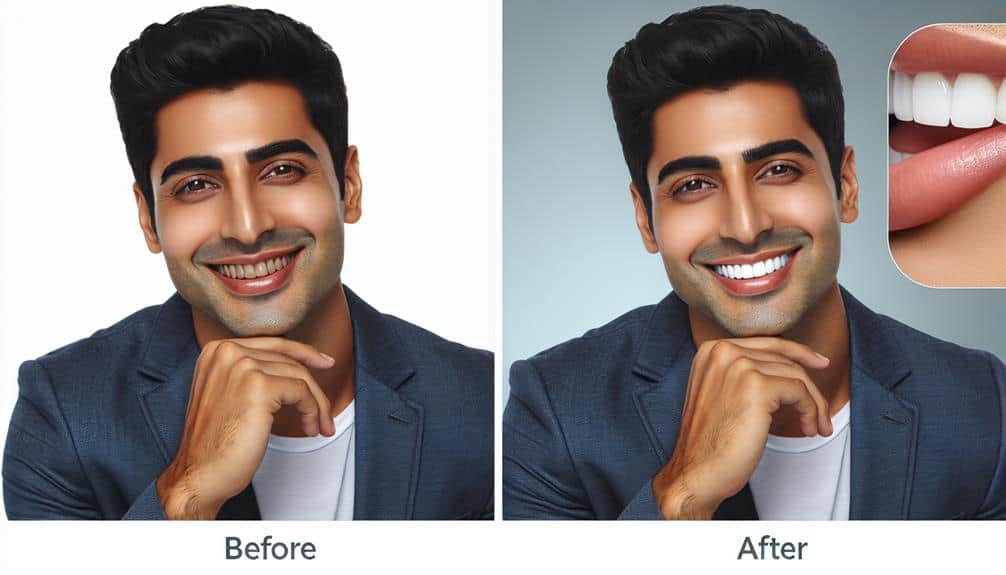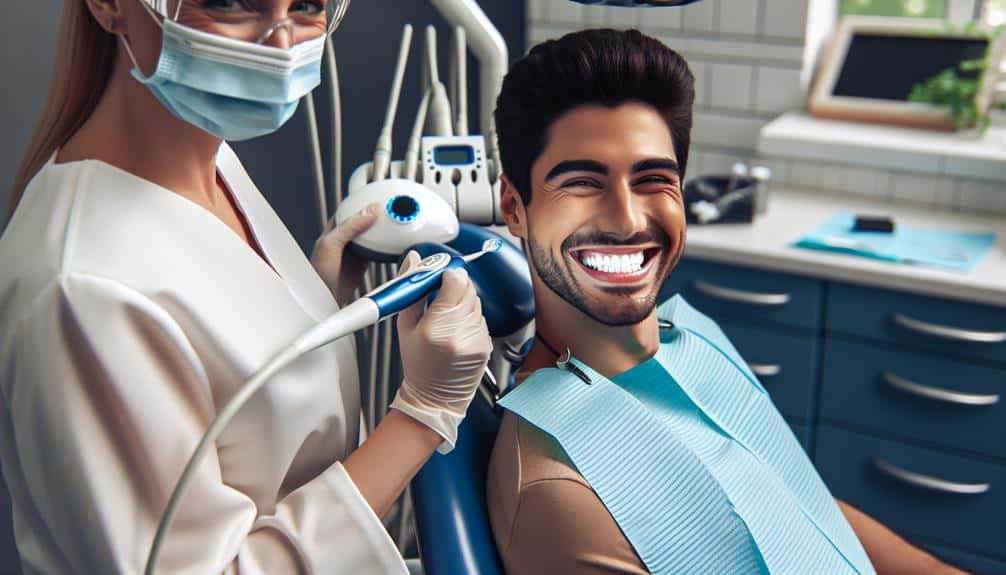When seeking the safest teeth whitening option, your best bet is to consult with a dentist to tailor a personalized treatment plan suited for you. This allows the use of stronger whitening agents in-office, which can provide long-lasting effects and prove to be a worthwhile investment in achieving a brighter smile.
Key Points
- Consulting with a dentist ensures safety and personalized treatment plans.
- Professional in-office treatments use stronger, yet safe, whitening agents.
- At-home kits offer convenience with mild whitening agents for safe use.
- Natural remedies like oil pulling and baking soda provide safe whitening alternatives.
- Regular dental supervision minimizes risks and ensures the safest whitening results.
Professional Whitening Options
When considering professional whitening options, consulting with a dentist is essential for achieving the best results. A dentist consultation allows for a personalized treatment plan to be created, ensuring that your specific needs and goals are met.
In-office treatments are one of the most effective ways to whiten teeth quickly and efficiently. These treatments often involve stronger whitening agents than over-the-counter products, leading to more noticeable results in a shorter period.
In terms of cost comparison, professional whitening treatments tend to be more expensive than at-home kits. However, the effectiveness and duration of the results are usually superior. While the initial investment may be higher, the long-lasting effects of professional whitening can make it a worthwhile option for those seeking significant and lasting improvements in the brightness of their smile.
At-Home Whitening Kits
At-home whitening kits offer a convenient and cost-effective way to brighten your smile in the comfort of your own home. These kits typically include whitening toothpaste, whitening strips, LED whitening devices, and charcoal powder, providing a range of options to suit individual preferences.
Whitening toothpaste contains mild abrasives or enzymes that help remove surface stains. Whitening strips are thin, flexible plastic strips coated with a whitening gel containing peroxide. They're applied directly to the teeth and left on for a specified amount of time to bleach away stains.
LED whitening devices use light technology to enhance the whitening gel's effectiveness, accelerating the whitening process. Charcoal powder is a natural alternative that can be used to gently polish and whiten teeth.
When using at-home whitening kits, it's essential to follow the instructions carefully to achieve the best results while minimizing the risk of sensitivity or damage to the teeth and gums.
Natural Teeth Whitening Remedies
Consider natural teeth whitening remedies as a gentle and chemical-free alternative to traditional whitening methods. These DIY whitening tricks and holistic whitening methods can be effective in brightening your smile naturally. Here are some popular options to explore:
- Oil Pulling: Swishing coconut oil in your mouth for 10-15 minutes daily can help remove plaque and whiten teeth.
- Baking Soda Paste: Mixing baking soda with a small amount of water to create a paste can gently scrub away surface stains.
- Fruit Peels: Rubbing orange, lemon, or banana peels on your teeth can provide a natural whitening effect due to their citric acid content.
- Strawberries and Baking Soda: Mashing strawberries with baking soda to create a paste can help remove stains and brighten teeth.
- Activated Charcoal: Brushing with activated charcoal powder can absorb toxins and stains, resulting in a brighter smile.
Explore these natural remedies for a safer approach to teeth whitening that aligns with your preference for chemical-free solutions.
Risks and Side Effects
To understand the potential risks and side effects associated with teeth whitening, it's essential to be aware of how certain methods may impact your oral health. When considering teeth whitening, it's important to seek dental supervision to minimize the risks involved.
One of the primary concerns is sensitivity, which can occur during or after the whitening process. Some individuals may experience heightened sensitivity to hot or cold temperatures. Additionally, there's a risk of enamel damage, especially with over-the-counter products or excessive use of whitening treatments. Enamel is vital for protecting your teeth, and any damage to it can lead to long-term effects on your oral health.
It's crucial to follow recommended guidelines and consult with a dentist before starting any teeth whitening regimen to ensure safety and effectiveness. By being mindful of sensitivity concerns and the potential for enamel damage, you can make informed decisions about the safest teeth whitening option for your dental health.
Maintaining Whitened Teeth
Maintain your whitened teeth by adopting a consistent oral hygiene routine to preserve the brightness and health of your smile. To guarantee your teeth stay white and healthy, consider the following tips:
- Diet Choices: Opt for teeth-friendly foods like fruits, vegetables, and dairy products. Avoid excessive consumption of staining beverages like coffee and red wine.
- Oral Hygiene: Brush your teeth at least twice a day with a whitening toothpaste and floss daily to remove plaque and prevent stains.
- Lifestyle Habits: Minimize habits that can stain your teeth, such as smoking or using tobacco products.
- Preventive Care: Visit your dentist regularly for professional cleanings and check-ups to maintain your whitened teeth.
- Consistent Care: Stick to your whitening routine as recommended by your dentist to prolong the results and keep your smile radiant.
Frequently Asked Questions
Can Teeth Whitening Procedures Affect the Sensitivity of My Teeth?
When you whiten teeth, sensitivity can occur. Manage it with desensitizing products. Before whitening, consult a dentist. Enamel protection is essential. Follow precautions like using fluoride toothpaste. Sensitivity management is key for a comfortable experience.
Is It Safe to Whiten Teeth if I Have Existing Dental Restorations Like Veneers or Crowns?
If you have existing dental restorations like veneers or crowns, it's generally safe to whiten your teeth, but it's important to consult your dentist first. They can advise you on the best approach for veneer compatibility and crown considerations.
How Long Do the Results of Teeth Whitening Typically Last?
To maintain teeth whitening results, diligent oral care is key. Longevity varies based on habits. Touch-up options like whitening toothpaste can help prevent discoloration. Follow maintenance tips and see your dentist regularly for best results.
Are There Any Age Restrictions or Limitations for Teeth Whitening Procedures?
When contemplating teeth whitening, age restrictions or limitations may apply due to the potential risks and effectiveness. It is crucial to weigh the benefits, side effects, maintenance, and cost of professional vs. at-home options before proceeding.
Can Certain Lifestyle Habits, Such as Smoking or Consuming Staining Foods and Beverages, Affect the Results of Teeth Whitening Treatments?
Considering lifestyle habits like smoking or consuming staining foods and beverages can have a notable impact on teeth whitening results. Professional treatments tend to be more effective in combating these issues compared to at-home options, ensuring a brighter, longer-lasting smile.
Conclusion
To sum up, when it comes to choosing the safest teeth whitening option, professional whitening treatments are like a reliable vessel sailing through challenging waters. They're closely supervised by dental professionals and provide efficient results without jeopardizing your oral health.
However, at-home whitening kits and natural remedies can also be secure choices when used correctly. Remember to assess the risks and benefits, and always prioritize your dental health when seeking a whiter smile.



